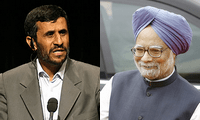India's central bank, the Reserve Bank of India (RBI), announced in late December that it would no longer allow Indian importers to trade with Iran using the Asian Clearing Union (ACU), saying it wanted to explore an alternate means of facilitating trade-related payments. The move came as something of a surprise, even though the U.S. had been pushing India to take this measure for quite some time. For its part, Iran did not welcome the move and initially put the onus on India to find an alternative mechanism. Talks are currently underway to resolve the issue. Nevertheless, the episode has underlined the fact that India cannot always avoid zero-sum games as it emerges into becoming a full-fledged global power.
The ACU was established in 1974, with headquarters in Tehran, under the aegis of the United Nations Economic and Social Commission for Asia and Pacific. Its purpose is to facilitate payments among member countries for certain multilateral transactions, thereby providing savings on the use of foreign exchange reserves and transfer costs, as well as promoting trade among participating countries. Trade takes place in the dollar and euro, with settlements made on a net basis at the end of every two months, taking into account the position of all members. Current participants are Iran, India, Bangladesh, Bhutan, Nepal, Pakistan, Sri Lanka, Myanmar and the Maldives.
While making life easy for members' importers, the group settlements make it very difficult to keep track of individual transactions, thereby making it difficult for India to comply with global nonproliferation efforts targeting Iran. That had become increasingly unacceptable to both the U.S. and the EU, leading American and European banks to begin demanding end-user certificates for individual ACU transactions involving Iran. Following the RBI's suspension of the ACU mechanism, Iran proposed designating the Hamburg-based European-Iranian Trade Bank (EITB) for payments. But the RBI rejected the EITB on similar grounds, since it had been blacklisted by the U.S. Treasury Department.

